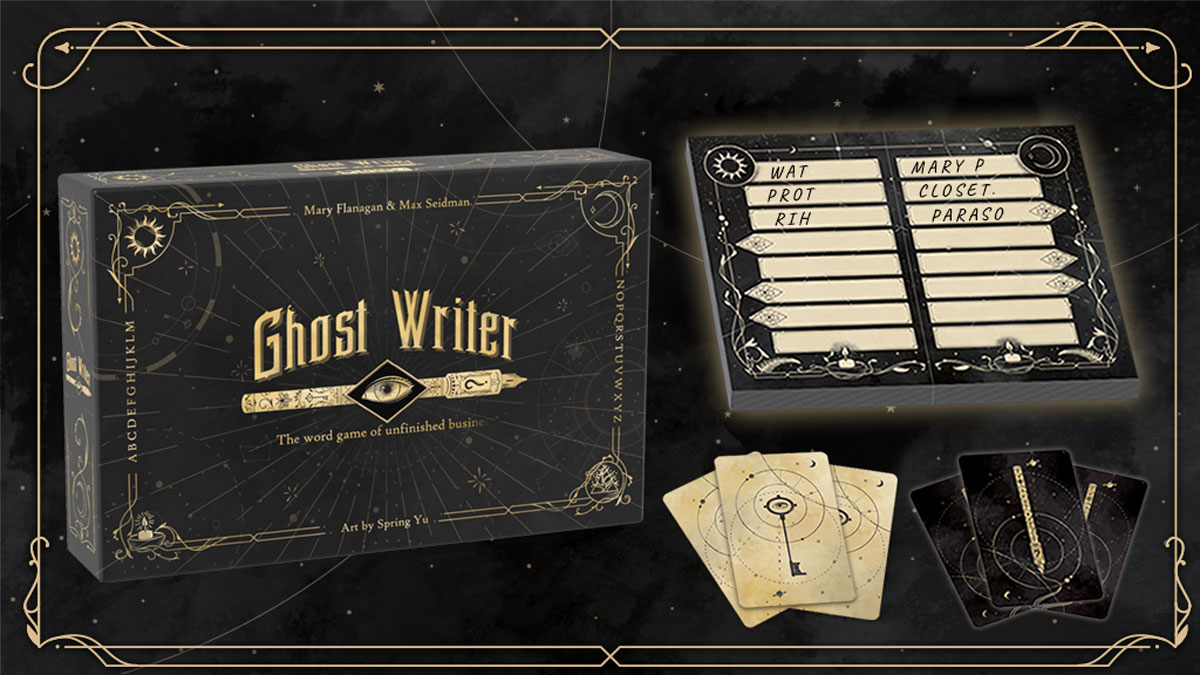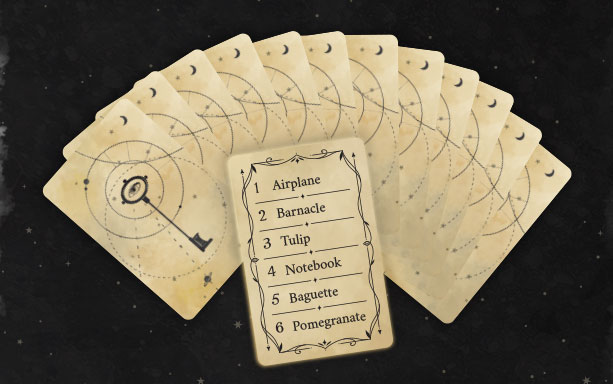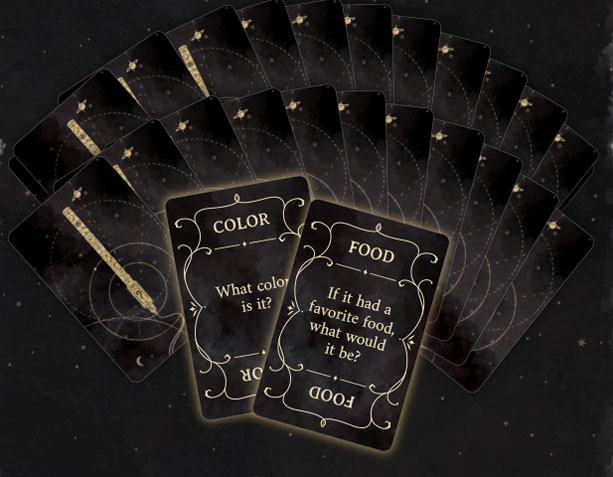
The spirits from the Great Beyond have a message for you … but which medium will decipher it first?
What Is Ghost Writer?
Ghost Writer is a word party game for 4 to 8 players, ages 13 and up, and takes about 15 minutes to play. It’s currently seeking funding on Kickstarter, with a pledge level of $25 for a copy of the game. The theme is based on a seance, with the “ghost” writing clues down one letter at a time, but the words and questions do not have any specific ties to the occult, so it’s up to you how much you want to play up the “talking to the dead” aspect if you’re playing with younger kids. The gameplay itself isn’t too difficult, but the giving and interpretation of clues may be tricky for younger players, as with many clue-guessing games.
Ghost Writer was designed by Mary Flanagan and Max Seidman and published by Resonym, with artwork by Spring Yu.
New to Kickstarter? Check out our crowdfunding primer.

Ghost Writer Components
Note: My review is based on a beta web version, not a physical prototype, so I don’t have any photos, but here’s what will come in the box:
- Notepad
- 100 Question cards
- 50 Object cards
- 2 Pencils
The artwork by Spring Yu (as seen on the Kickstarter page) looks great: it’s mostly a word game with text-based cards, but the illustrations help reinforce the theme, evoking dark rooms and candles and arcane symbols.
Each object card has 6 items on it—these are just various nouns. There’s a wide range of question cards, things like “What does it taste like?” or “If it was a social media website, what site would it be?”
The scoresheet is a pretty straightforward: two columns, one for each team, with eight spaces on each side, and a few spaces marked with an eye icon.
How to Play Ghost Writer
You can download a copy of the rulebook here.
The Goal
The goal of the game is for your team to guess the secret object based on the clues from the spirits.

Setup
Choose teams; pick one player on each team to be the spirit, and the rest of the players are mediums. Shuffle the item deck and draw one item card—the two spirit players look over the card together secretly, and choose which object will be the goal for this game. (Note: both teams will be trying to guess the same object.) Give each of the spirits a pencil and place the notepad in front of them.
Each team gets 7 question cards for the mediums. (If there is more than one medium on a team, they share the hand of 7 cards.)
The Sun team goes first.
Gameplay
On your team’s turn, the mediums may choose to ask a question or guess the object.

To ask a question, pass two question cards secretly to your spirit. The spirit chooses which question to answer and passes the card back to the mediums, and discards the other question face-up. (The other team cannot see the question that your spirit is answering.)
The spirit writes the answer to the question one letter at a time, also saying out the letters as they write. At any time, if the mediums think they know what the clue is, they can say “Silencio” and the spirit stops writing (after finishing any half-written letters). If the spirit completes the entire clue before being stopped, they end with a period.
Game End
If your team’s mediums successfully guess the object, then you win!
If both teams have taken 8 turns and neither team has guessed the object, then both teams lose. Your connection to the spirit realm has been broken, and you’ll have to wait until next time.

Why You Should Play Ghost Writer
There are a lot of games out there now that involve trying to guess answers based on clues: Codenames has you trying to connect several different words with a single word clue; Decrypto lets you use a secret set of code words to communicate with your own team while your clues are visible to everyone. (Resonym’s own Visitor to Blackwood Grove has you trying to guess a logic rule based on objects that pass or fail against it.)
Ghost Writer has an element that reminds me of Decrypto: you can only see the questions being asked and answered by your own team, but you see the spirit’s answers for both teams. Over time, even without the questions, you might be able to figure out what the spirit is referring to with enough clues. So that’s where the second trick comes in: interrupting the spirit with “Silencio!” Since you know the question you asked, you might be able to figure out what the spirit is writing as an answer before the other team understands it, and it’s to your advantage to give them as little information as possible.
Thematically, tying these to a seance setting is a brilliant idea. Whether you’re imagining the letters appearing on a foggy mirror or a planchette moving around on a ouija board—or, you know, blinking Christmas lights strung across an alphabet marked on a wall—it takes some time for the spirit to communicate a full word or phrase to you. Also, communication can be a little hazy, which is why you can’t just come out and say “what object are you thinking of?” You have to ask these strange, oblique questions, dancing around the subject matter to get to the answer.
Being restricted to a hand of seven questions is both necessary and frustrating. If you were allowed to ask any question you wanted to (for instance, just writing down a question to pass to your spirit), the game would be too easy. On the other hand, what are you to make of a question like “If it was an alcoholic drink, what would it be?” The randomness of the questions also makes it harder for the other team to know what you’re up to. One question that I found particularly entertaining: “What has nothing to do with it, to confuse the other team?”
The “eye” spaces on the sheet aren’t a huge game-changer, but can provide just a little more info before you make a guess or ask a question. For instance, if you realize maybe you stopped your own spirit too soon and have been misinterpreting their clue, you can ask for another letter there. Usually, though, I’ve seen the eye spaces used to extend a clue from the other team, so you get a better idea of what the answer was.
I also like the way that guesses work, because you have to spell out the answer one letter at a time. If you’re wrong, the other team may be able to figure out what you were thinking—which then helps them interpret the clues that your spirit gave you. In Ghost Writer, it’s all about limiting the information that you show to the other team, so you have to be careful about when you decide to take a guess.
I’ve mostly played this game with smaller groups, only 1 or 2 mediums per team. There is a bit of “two heads are better than one” when it comes to figuring out the clues, but it can get a little unwieldy if you have too many people on a team, especially in deciding when it’s appropriate to silence the spirit. With a 4-player game, where you just have a spirit and a medium on each team, the game may feel a bit closer to the theme because there’s less cross-chatter between teammates. (I’ll mention that if you have more than one medium on a team, they are allowed to communicate secretly with each other during the course of the game.)
So far in the several times I’ve played Ghost Writer, somebody has always guessed the clue before we ran out of turns, but I could see it ending without a winner as well, just based on the mix of the questions and how risky the mediums decide to be. As with many games of this nature, a lot of your experience will depend on the group that you’re playing with: how good are the clues that the spirits give? Do you know your teammates well enough to give succinct hints, or to choose questions that will provide meaningful answers? I could see this game being super serious or entirely silly, just depending on the players, but most of my games have had a good bit of laughter as we try to figure out what is that spirit trying to spell? Or, conversely, why are my mediums asking me such ridiculous questions?
I’d recommend Ghost Writer primarily to groups that enjoy the genre of clue-guessing games, especially if they’re fond of wordplay and word puzzles. It was extremely satisfying to guess the word “cat” based on the clues “FU…” and “FELI…” in one game I played, or to watch people scratching their heads over the clue “W…” after I stopped the spirit. It’s quite a different game from the logic puzzle of Visitor in Blackwood Grove, but I think those who like Decrypto and Codenames may like this new twist.
For more information or to make a pledge, visit the Ghost Writer Kickstarter page!
Click here to see all our tabletop game reviews.
![]() To subscribe to GeekDad’s tabletop gaming coverage, please copy this link and add it to your RSS reader.
To subscribe to GeekDad’s tabletop gaming coverage, please copy this link and add it to your RSS reader.
Click through to read all of “Kickstarter Tabletop Alert: Spooky Spelling in ‘Ghost Writer’” at GeekDad.If you value content from GeekDad, please support us via Patreon or use this link to shop at Amazon. Thanks!




